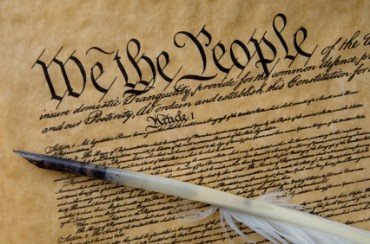By Adam Bitely 
After the Revolutionary War, the Founding Fathers were nervous about a strong executive. This can be seen in the way that they wrote the Constitution. Our nation’s founders decided to create a stronger legislative branch than that of the executive branch as established in Article II. The Founders intended the legislative branch to check the powers of the President as well as be a voice of all the people.
By design, the legislative branch is weak in the sense that there is no one person holding all of the power. The legislative branch is composed of the House of Representatives and the Senate, which together form Congress. Each state elects two senators and a number of members to the House of Representatives depending on the size of each particular states population.
Even further, the legislative branch was given direct authority over several tasks. The Founders did this so that Congress and the people would know the limits of its powers. They broke Article 1 into 10 sections that explicitly grant Congress all of its authority.
Section 1 of Article 1 grants all legislative powers to the Congress and creates both the House and the Senate. Sections 2 and 3 sets requirements for eligibility to serve in the House and Senate respectively. In Section 2, the power is given to the House to determine its Speaker and does not note that the Speaker has to be a member of the House. Theoretically, the Speaker can be any citizen that the members of the House elect, although no Speaker has ever not been an elected member of the House.
Section 4 mandates that Congress must assemble at least once a year. It does not stipulate that Congress be a full time legislature. Further, section 4 says that the power to determine the elections of Senators and Representatives lies with the legislature in each state, but it allows Congress to alter the laws made by the state legislatures regarding the time and manner of such elections.
Sections 5 and 6 further set regulations on how Congress operates. But the real limits on Congress come in Sections 7 and 8. The powers granted to Congress in Article 1 are the extent of their powers. The Founders designed the Constitution as a limit on Federal power, not a starting point for power to be expanded upon.
Section 7 mandates that all bills for raising revenue shall come from the House of Representatives. The Senate does not have the power to tax, only the House. Further, section 7 also creates the procedure for a veto of a bill.
Section 8 is arguably the most important section of Article 1. Inside of Section 8, the limits of Congressional power are established. Congress has the authority to collect taxes, borrow money, regulate commerce, to create money and punish those that fraudulently do, establish post offices and roads, promote the progress of science and arts and provide patents, to declare war as well as fund the army for a period of no more than two years, provide and maintain a navy, to provide for the Militia, to exercise exclusive Legislation over the federal seat of power in Washington D.C., and to make laws that are necessary in carrying out the listed powers and all those necessary as described by the Constitution.
Missing in Section 8’s listing of Congressional powers is the authority to provide Health Care, mandate the purchase of a specific product or service to all U.S. citizens, provide a retirement program for all U.S. citizens, regulate carbon emissions from U.S. businesses and citizens, and the authority to own companies. However, we find that out current Congress sees all of those unlisted powers as being “Constitutionally granted”. But a close reading of Article 1, Section 8 shows us that no such authority exists.
The power that the legislative branch has today would cause our Founding Fathers to roll over in their graves. The authority Congress now holds is unprecedented in U.S. history. Further troubling is that there seems to be no one in the federal government checking this blatant overstep from our Congressional leaders.
As we are all aware, the nation is in trouble. The Founding Fathers left us with a great document that holds our government in check and at a sustainable size that protects individual liberty. The current congress has paid no heed to the law of the land and is instead making their own laws ignoring the authority they have as listed in the Constitution in Article 1. If we do not soon get back to the founding principles, we will surely find ourselves without a way to get out of the quagmire we are in.
Adam Bitely is the Editor-in-Chief of NetRightDaily.com.

